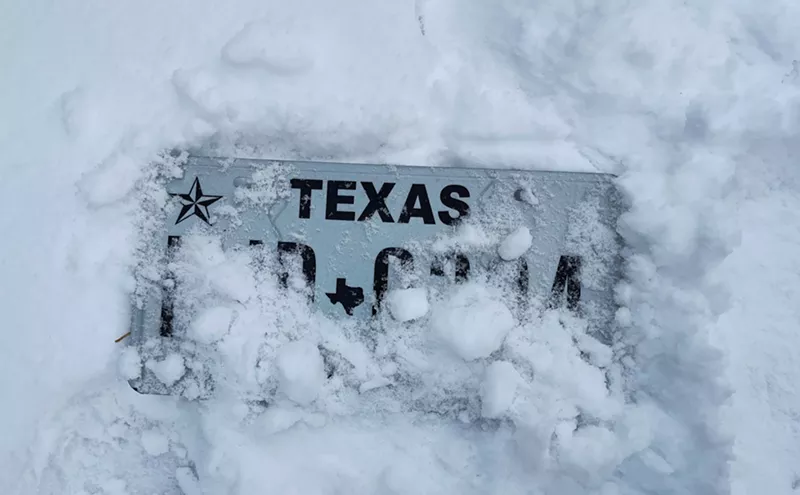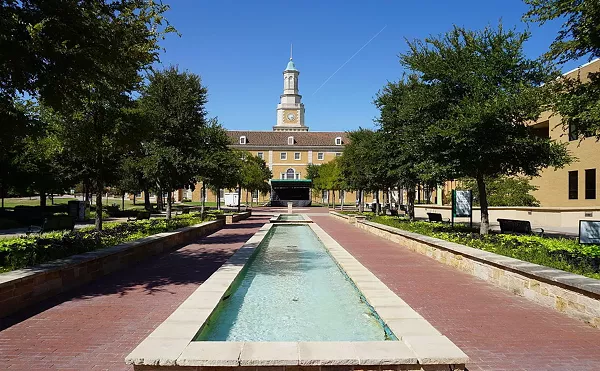You heard it here first. Possibly. If you have already heard it somewhere else, please keep that to yourself. I want the credit.
North Oak Cliff is the new Austin.
Only better than Austin. Because the new community being created in Oak Cliff is for people who actually have jobs. And those people are creating the world around them. They are making it happen, not just showing up and going along for the ride. That's a big difference.
A very interesting class of 20-to-maybe-40-somethings is gathering in Oak Cliff, putting down roots as a sort of modified Bohemian community, but not really Bohemian. They often have partners, families, jobs. It's a phenomenon that doesn't quite have a name yet. For now, until someone cleverer comes up with a better name, let's call them Bikos. For whatever reason, bicycles are central to their worldview. Vegetable gardens are in there, too, but I don't want to call them Veggos.
These are not hippies. I know hippies. In the midst of these new people are lots of artists, of course, but many of them are lawyers and teachers and urban planners and such. They're both more worldly and in a way more idealistic than hippies—an idealism alloyed with direction.
Last week I rode around Oak Cliff with Mariana Griggs of Community Gardens of Oak Cliff, an umbrella group that oversees six community gardens. She is a teacher. Her husband, Scott, is a lawyer. I guessed she was a 20-something. She's 33, and her husband is 35. My fault. Everybody under 50 looks 15 to me. Only fair. I look 110 to them.
While we rode, she told me about a trip she and her husband took to Europe last August.
"We went to Copenhagen and Amsterdam for kind of a little bike reconnaissance project, to go check out their bike lanes and ride bikes.
"We just loved it. We didn't want to come back. We wanted to live there."
I asked, "How are they about bikes?"
"Oh, it's amazing," she said. "Everybody has a bicycle. Cars have to yield the right-of-way to bikes. It's easier to get places. It's a lot more flat. There's a lot of bike parking. It's what everybody's doing. If you know how to ride a bike already, you're going to do really well."
I said, "See, that's why you shouldn't go to places like that. It's that ride back from the airport that gets you..."
She finished my thought: "It really is. 'Oh, I have to come back here?' Miserable! But then you have to look at it again from a point of view where you say, 'Here, I have the chance to move everybody in that direction.'"
I sense the center of things in that last comment. It's not quite the same as the pleasure of living in a cool place. After all, by most objective measures, Oak Cliff isn't high on the cool scale yet. It's more the excitement of believing you are involved in the creation of a new cool place.
I got the same thing recently in a conversation with Jason Roberts, founder of Bike Friendly Oak Cliff and a subject of Kimberly Thorpe's Observer cover story, "Why Don't We Do It In The Road" (November 26). He talked to me about that same push and pull—visiting a wonderful place elsewhere, coming home to harsh reality, crashing, then discovering the excitement of making this place into one of those places.
North Oak Cliff—the old part of Oak Cliff—is not Old East Dallas all over again. It's quite different. In East Dallas, where I live, we believe we saved our world by fighting off redevelopment. I think this new cool Oak Cliff wants redevelopment. But Biko redevelopment. It's a less rigid place than East Dallas. In fact that was why I was there.
The previous week I had written about a brouhaha in East Dallas concerning efforts to create a community garden in a neighborhood near White Rock Lake. The homeowners in the area rose up in high dudgeon to smack down what they saw as a dangerous invasion of their turf by rough-riding elitist cultural Cossacks.
Gardeners? Cossacks? What does that tell you about East Dallas?
I can tell you what it tells you. Don't come to East Dallas talking about anything new unless you want to get a pointed board from a white picket fence driven through your heart. And guess what! Most of the time, I'm with the picket fencers. I guess I'm just a creature of my own culture.
I had written several times about the ridiculous hurdles people around the city face when they want to create community gardens. I was aware that several successful new gardens are under way in Oak Cliff, and I didn't want to leave the impression it's all hopeless.
So I found my way to Griggs. I asked her to show me the Oak Cliff gardens and tell me why the Oak Cliff gardens work, especially when people in the rest of the city are having so much trouble with City Hall.
I found two answers to my puzzle. First of all, the Oak Cliff gardens have happened because the people right around them want them. They have grown up organically—not a pun—in communities determined to make them happen.
But secondly—and I think this is more interesting—the Bikos don't go straight to City Hall with their issues. They sort of bike around it. While people in other parts of the city waste precious time, energy and heartbeats scheduling meetings with city council members and talking to city staff, the Oak Cliff people just go ahead and do it, following the maxim that it's better to ask forgiveness than permission.
The half dozen gardens Griggs showed me were all on private land, so nobody had to go to the city and ask for permission to use public land. As far as zoning and primary land uses and all of those things go, Oak Cliff community gardeners have sort of plunged ahead on the assumption that they're doing the right thing anyway.
"I'm not going to rely on City Hall to tell me what I can physically do," Griggs said. "I'm not thinking about what I'm doing as something that's really harming anybody. If anything, we are improving the land. We're not trying to hurt the land. A lot of our stuff is based on ecological principles and conservation and good stuff for the environment. We are increasing the quality of life.
"So I'm not going to sit around and wait for them to say, 'OK, now you can go do it.' But if I need them, I imagine I will go asking. But until now, I haven't needed them."
As I have reported here before, Dallas City Hall has embarked on a grand community gardening policy project: City officials with tape recorders and note pads will gather public sentiment at countless public hearings and then turn all of that over to the planners and then turn the planners' work over to the budget people and then the budget people's work to the lawyers and the lawyers' work to the politicians. With any luck, City Hall won't have to actually make a decision on a single community garden for at least two years.
If you're me, that kind of stuff drives you crazy. If you're Griggs and the Oak Cliff community gardeners, it just drives you away. From City Hall.
"We have our own policies," she told me. "We're not running amok."
She and I talked about the fears expressed in East Dallas that a community garden would quickly become a disheveled noisome place unless it was policed by City Hall. She said simple peer pressure among fellow gardeners is much more effective than official policing. If somebody leaves tools or plastic bags or piles of dead weeds lying around, a fellow gardener calls to ask in sympathetic tones if he's had a family tragedy or fallen off the wagon or something.
"We stay on people," she said. "Social criticism hits harder than any kind of legal ramification."
Let me be careful about what I'm saying here. I am not saying the way to do community gardens is to just go set them up willy-nilly as a form of squatting. First of all, that's not at all what the Oak Cliff garden group has done. Their gardens are associated with major institutions such as Methodist Hospital and several churches, as well as including plots on private residential land volunteered for the purpose by generous owners.
Another issue is what to do with a community garden once you've got one. I spoke last week with Don Lambert, director of Gardeners in Community Development, a nonprofit devoted to neighborhood improvement through gardening, and he expressed his frustration with people who don't pay attention to the gardening part.
"They have this backward idea that gardening is simple and that a garden is just a place," he said. "They want to create a garden, but they won't even talk about gardening."
Lambert said a woeful lack of gardening knowledge is a major pitfall in neighborhoods, rich and poor. "Hardly anybody knows how to garden any more, and the poor have probably been ripped away from their roots as much as anybody."
So, listen. I'm not sitting here singing "It's a gift to be simple." I don't think community gardens are simple. I'm not even talking about that. It's a larger theme.
The people I see creating their own community in North Oak Cliff—from individuals like Griggs and her husband to developers like David Spence and Monty Anderson—have an approach to things that is more self-determining but also a bit looser than what I have seen over the years in Old East Dallas. They know what they want. They know how to get there. They'll ask for the city's help when they need it.
They're Bikos. They bike around. You heard it here first.












